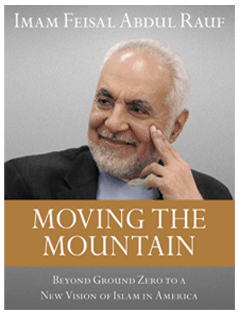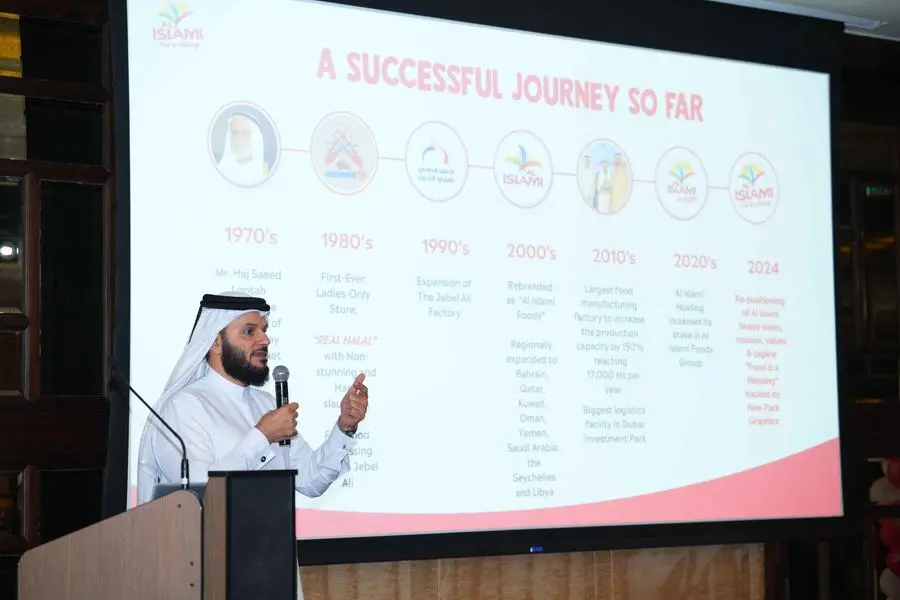 Imam Feisal spoke with The Halal Monk about God, Islam, interfaith cooperation, and Moving the Mountain. Read the full interview below or on halalmonk.com.
Imam Feisal spoke with The Halal Monk about God, Islam, interfaith cooperation, and Moving the Mountain. Read the full interview below or on halalmonk.com.
For more than a quarter of a century Imam Feisal Abdul Rauf has been involved in interreligious and intercultural dialogue on high levels. He’s the sort of religious leader that gets asked to speak at the World Economic Forum, for example. But the reason he and his work eventually got world-wide attention was because of a heated and heavily politicized media-debate: some people opposed his plans to build a Muslim community center a couple of blocks away from Ground Zero. The critics of the center had little attention for the fact that imam Feisal intended the center to be a ‘Cordoba House’ – a place where people could meet other people of different faiths in a spirit of openness and dialogue – so the discussion went on for weeks and even got into the international press. Yet the debate eventually died out, the plans for Park51 (as the project was renamed) continued with the explicit support of the Mayor of New York and Imam Feisal simply continued his never relenting interreligious work at The Cordoba Initiative.
I met this gentle, warm and inspiring man in his office in New York for a conversation on fear and love – the fear of and love for Islam within the global society as well as the fear of and love for God within ourself.
Suppose you knew that you could teach the world only one message in your whole life, what would it be?
Well, given the misperception of people that Islam is a religion of terrorism and exclusiveness, the biggest thing I would like people to know is that Islam is a religion of love, peace and compassion. Islam is a religion of the oneness of human kind and there’s a need for us to establish that as the basis of our sense of community.
That is why my latest book is called ‘Moving the Mountain’. I want to move the mountain of suspicion. I want to remove the mountain of misunderstandings of Islam. I want to remove the myths that people have of Islam as a religion that is negative and violent. I wish to get rid of the image – shared even by Muslims – that there would be only one right interpretation of Islam.
An honorable goal, to say the least, but we all know that in these days it isn’t an easy task. In many ways, a lot of people seem to become more islamophobic. How do you think this climate of fear for Islam will evolve?
Islamophobia is indeed on the rise, but I think that acceptance of Islam is as well. What is important however is that we develop an ‘American Islam’ – or a Belgian Islam, a French Islam and a German Islam for that matter. What I mean by that is not that the theology would be different, but that the jurisprudence, the laws, the cultures and the practices would vary according to the context.
I base this upon the history of Islam itself. Islam spread from Arabia to Egypt to Byzantium to Persia to India to Africa. And it expressed itself in all of those cultures through different forms of architecture, calligraphy and music. So we, as American Muslims, also need to develop a personal American Muslim identity that expresses itself through the culture of our context.
For as much as I can see, this ‘renewal’ of Islam – in which people look for new ways to adapt the basic essence of Islamic living and practice to the new contexts of the modern world – is in fact happening already, but above all in the migrant communities. That is to say: I can see how a lot of members of migrant communities still look at scholars in the east but at the same time I have the feeling that a lot of the ‘new’ ways of thinking about Islam comes from Muslim scholars in the West.
You are right about that because in the West there is a lot of intellectual and academic freedom. Muslim scholars in the West can write more freely. Look at someone like Rashid Al-Ghanoushi, who was previously living in France. He is now back in Tunisia after the evolutions of the Arab Spring but he could previously only express himself freely from France. That is why he said that France is an Islamic state because we are free to practice our religion there. He used an element of Islamic law to back up his argument since the classical definition of Dar-Al-Islam calls any country a part of the Dar-Al-Islam where Muslims can perform the Adhan, can go to the Friday prayers freely and can bury the dead in Muslim cemeteries. So yes, it is in the West that many new ideas and initiatives are surfacing and the West can indeed be viewed as a part of Dar-Al-Islam.
You’re a Sufi yourself. Do you see a specific place for Sufism in this ‘renewal’ of Islam?
Sufism exists all over the world. And I think it’s an important part of our faith since it is the spiritual dimension of our faith.
In any authentic spirituality there is an experience of God. As a Muslim, I’m supposed to ‘bear witness there is a God’. But how do I ‘bear witness’? Unless I learn to experience his existence spiritually, all I’m doing is acting like a parrot – repeating words. So for me, it’s through Sufism that you gain a genuine experience of the faith.
So when you invite people to seek a common ground for the different religions, like you do in your book, do you have the spiritual level of religion in mind – or still rather the ethical level?
Both. The golden rule – “do not do unto others what you do not want others to do to you” – has come to all religions and that is most certainly a very powerful common ground. On top of it, within Abrahamic religions there is of course also the belief in one God. So there is much common ground to build our common ground upon.
And the differences, well, those should be celebrated. It’s not because you’re Belgian you can’t enjoy Turkish kebab or Baklava. And the same is true for music, rituals, and so on. Most things simply aren’t exclusive.
Considering there is so much common ground. How then, do you reflect upon those situations in certain countries where converting to another faith as a Muslim gets penalized – sometimes even with a death sentence?
That is simply wrong. I explain this in my book as well. It’s a wrong interpretation of old laws. Every instance where, in the prophet’s time, conversion was related with death penalty it went together with treason. It happened during a time of war between Medina and Mekka, where apostasy wasn’t just apostasy. It was treason because they were people that had first left the community and then fought against the community. That kind of treason has always been a capital crime. Even in the United States. But when the Prophet finally came to a treaty and peace with Mekka he even agreed in writing that anybody who had left the Muslim community could peacefully go back. That is why one of my friends, who is a judge in the high court in Pakistan, says apostasy simpiciter (i.e. the act of leaving one’s faith community) is not a punishable crime. Of course it is the biggest sin and God will punish it in the hereafter but we have no authority to enact any punishment. Just like it is a sin not to pray, not to fast, to eat pork, etc. Those aren’t sins that we can punish because they aren’t sins that hurt anybody. The only sins which are punishable on earth are the sins that hurt people – like killing, stealing, etc.
Do you truly believe that God, in the hereafter, will in fact punish those people that were Muslim but converted to another faith in which they say they found love and light?
I personally belief that whoever follows his conscience, is a Muslim in God’s eyes. You can be a Muslim in the sense of ‘following the tradition of the prophet’, but that is not entirely the same as being a believer in God. A real Muslim is ‘someone that submits’. So the person that believes in God and the last day and does good, has nothing to worry about because God defines your religion upon your belief in Him and your ethics. What you call yourself is immaterial.
I hear a plea for a religion of genuineness, lived from the heart and soul… I could probably expect as much from a Sufi scholar. As a Sufi scholar then I’d like to ask you one final spiritual question which I’ve been wondering about. Being a contemporary Christian I can of course relate very easily to the idea of love and oneness as the basis of religion, but within Quran one does also constantly encounter the concept of takva – the fear of God. And that is a concept I am not very much acquainted with. Even more so, it seems rather counter-intuitive to my perception of God as an infinite source of love. So I am very eager to know how a Sufi like yourself reconciles the love for God and the fear of God?
Fear and love are in fact flip-sides of the same coin. When you love someone very much, you fear to hurt them. And when you’ve done something wrong that might hurt the one you love, you feel bad about it and fear the reaction. So the more you love God, the more you fear doing something bad. When you’re going to the office of a very powerful person, you want their love, but you also fear their office and their power. And God is the absolute power.
It is like when you see somebody that is so tremendously intelligent or magnificently beautiful that whatever is in you somehow submits and prostrates in front of that person. I remember meeting such a person at Colombia University of who I thought he was an absolute genius and I could feel my mind and my brain somehow prostrate and bow down in front of his brilliance. So it is a positive fear that makes your heart go into prostration when you see an immense amount of beauty.
In fact ‘taqva’ means ‘to protect yourself’. As such, it does not just mean ‘fear of God’, but also ‘to protect yourself from God’. It’s a bit like the sun. We love the sun, but if you sit in the sun too long, you get sunburned. So however much you want to be in the sun, you also have to put a bit of lotion to protect yourself. And God is more radiant than a million suns. So if you don’t fear the intensity of the divine, you will get burned. That’s why God says: watch out, beware of my power and protect yourself. He even tells us which lotion to put on to protect ourselves from that: be good, love one another, etc. The spiritual ethics of religion are the protecting lotion of the believer.
…Imam Feisal pauses a bit, there is some silence and then he adds…
You know, the word ‘love’ is difficult. When you say ‘I love döner kebab’, ‘I love Mozart’, ‘I love Armani’ or ‘I love my wife’ you use the same word ‘love’, but what does it really mean? What is the dynamic? What is the interaction? When I say ‘I love my wife’, it doesn’t mean I’ll cook her, chop her up and eat her like a döner kebab. So what is love? Love is a function of the lover and the beloved. And the nature of the dynamic can be different even though we use the same word. So when we say we love God. What does it mean? How do we love God? Is it the way you love your wife? The way you love Mozart? The way you love döner kebab? We use words like love, fear, surrender and so on, but in the context of God it has much more complex meanings. They have much richer and deeper meanings. And they have a bigger spectrum of meanings because God is the source of everything. So when you use this terminology of ‘loving God’ and ‘fearing God’, it’s more than loving your wife, music, food, mathematics, novels, and so on. And yet it has aspects of all of that.
http://www.halalmonk.com/imam-feisal-abdul-rauf-faith-fear-and-love



